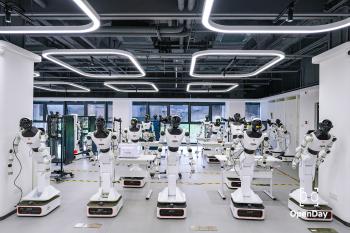Perfect Baked Goods in Record Time
02.06.2025 - 3D Laser Scanner Checks 100,000 Rolls Per Hour
3D sensor technology, combined with intelligent software, has revolutionized the inspection process in ultra-modern baking lines, allowing for the examination of up to 100,000 baked goods like croissants or rolls per hour. This advancement is crucial in industrial bakery production, where there is no room for error.
In Schleswig-Holstein, Germany, a standard sliced bread roll currently costs between 0.40 and 0.60 Euros on average. Prices for special rolls, such as grain rolls or pretzel sticks, are sometimes significantly higher. This price trend has led to a massive increase in expectations regarding the quality of industrially produced baked goods. Both producers and consumers demand consistent results in terms of appearance and taste. While supermarket chains aim to retain customers through consistent product quality, consumers are increasingly attentive to every detail as prices rise. Today, a bread roll should not only be fresh and crispy but also consistently look and taste the same.
With this in mind, system integrator ISW and technology company AT Sensors collaborated to develop a high-performance application for the automated quality control of baked goods. The objective was to create a solution capable of simultaneously detecting and evaluating a wide range of quality characteristics at high throughput without a clocked process. The initial impetus for the project came from Ilapak, an internationally active machine manufacturer headquartered in Europe that develops and produces packaging lines and baking lines for large industrial customers, including retail giants like supermarket chains.
As a long-standing manufacturer of baking lines, Ilapak is a key partner for many large bakeries worldwide. The company’s systems are characterized by their high robustness, scalability, and speed. Founded in Switzerland in 1970, Ilapak has developed into a global supplier of packaging machines. Its specialization in flexible packaging solutions has made Ilapak a partner to many food manufacturers who value productivity and quality. To set new standards in quality assurance, Ilapak aimed to upgrade its systems with modern 3D machine vision.
Previously, only line scan cameras with 2D technology were used, providing simple shadow images of the baked goods without information on exact geometry, surface structure, or detail distribution. However, end customers increasingly demand detailed information about shape, structure, elevations, volume distribution, or topping placement—a requirement that can only be met with 3D sensor technology.
The Challenge
The baked goods are inspected directly on the conveyor belts of the Ilapak systems without a timed process sequence. Several quality parameters must be checked simultaneously, including dimensions such as height and size, cutting characteristics, and specific surface properties like cheese distribution on lye pastries. Such complex inspection tasks exceed the capabilities of conventional 2D machine vision systems, necessitating the use of advanced 3D sensor technology.
"The production lines pass up to 100,000 bread rolls per hour, which are neither organized nor all next to each other, but rather partly on top of each other. The conveyor belts are also wider than one meter, so the sensor we were looking for had to have a wide field of view and a high resolution," reports ISW Managing Director Tobias Wichmann. He also explains that the inertia of the conveyor belts was a challenging factor during application development. "The industrial baking lines operate 24/7 and must not be interrupted. The large baking lines are programmed such that they sometimes have an hour's lead time if changes need to be made," mentions Wichmann.
An industrial baking line is a finely tuned interplay of several process stages that interlock seamlessly. From the raw dough to the packaged product, the entire production process is automated and continuous. As soon as a dough piece enters the line, it moves through proofing chambers, oven modules, cooling units, inspection systems, and packaging lines. This continuous movement ensures a constant throughput. If the line is stopped, the entire material flow jams. The oven can overheat, dough pieces overcook or cool down, and packaging units get out of sync. To prevent all of this, a line stop must be initiated with great care and a precisely calculated lead time of at least one hour. Therefore, every system used, especially for quality control, must function with absolute reliability.
The Solution
Ilapak and ISW had high requirements: to find a sensor manufacturer that not only met the technical requirements but could also be used reliably in industry. AT Sensors provided the solution with its modular MCS 2040 3D sensor.
A key feature of the MCS series is its modular design, making the sensors a solution for a wide range of applications. "The MCS stands for high flexibility: thanks to many configuration options, we build sensors that are precisely tailored to the respective application—whether cost-optimized or high-performance. Our aim is not to supply just any sensor, but exactly the right one. Because once you've worked with AT, you stay with AT," reports AT Sensors Head of Sales Dr. Athinodoros Klipfel.
With the MCS series, each sensor can be individually adapted to the specific requirements of the application—without additional costs, minimum purchase quantities, or long delivery times. At the same time, the sensors have standardized interfaces such as GigE Vision, simplifying integration into existing systems.
Each conveyor line was equipped with its own sensor, enabling high-precision measurement of the baked goods during operation. The MCS 2040 records 2048 measuring points per profile and achieves a resolution of 0.5 millimeters in the X-axis and an impressive 0.03 millimeters in the Z-axis. A field of view of 1 meter and a profile speed of up to 25 kilohertz ensure fast and continuous data acquisition even at very high throughput rates.
A red laser with a wavelength of 660 nanometers is used, delivering high intensity to the detector and enabling extremely sensitive and precise measurement. Additionally, the Multipeak and Multipart functions developed by AT Sensors allow the simultaneous detection and evaluation of several quality features, enabling comprehensive geometric and structural analysis of the products in real time.
The captured 3D data is processed using software developed by ISW, based on the Halcon image processing library. The processed information is forwarded directly to the programmable logic controller (PLC), where it controls the sorting mechanisms of the packaging system. This allows the baked goods to be packaged specifically according to defined quality and quantity specifications for the retail trade.
Why Supermarket Chains Rely on Quality Control
The stakes are high for large supermarket chains. Their brand image is closely linked to the quality of the products they sell. Especially for fresh foods like baked goods, customers expect a uniform appearance, fresh taste, and consistent texture. Deviations are quickly noticed and can lead to shopper churn. Supermarkets also have clear specifications for product quantities per pack. If a pack is delivered with too many or too few rolls, there is a risk of complaints or even contractual penalties. This makes it all the more important that quality control not only detects errors but also controls processes intelligently.
Long-Term Partnership Through Reliability
This quality control of baked goods has been successfully and reliably implemented for several years and is used by numerous end customers in Europe. ISW recently placed another order with AT Sensors for a large number of sensors to equip further baking lines. AT Head of Sales Klipfel comments: "As the company used to be an integrator itself before it shifted its core business to the manufacturing of sensor technology, AT understands exactly what its customers are looking for. We know what is important in practice, and I think that gives us a huge advantage in developing our products."
ISW has also been working with Ilapak for many years, quickly resulting in a suitable cooperation with which the partners were able to make a name for themselves internationally.
Conclusion
Thanks to AT Sensors' 3D sensor technology, ISW's software, and Ilapak's packaging lines, efficient and reliable quality control for baked goods has been established. This ensures that large supermarkets, for example, receive consistently high-quality products while minimizing economic losses due to production downtime.
Contact
AT - Automation Technology GmbH
Hermann-Bössow-Str. 6-8
23843 Bad Oldesloe
Germany
+49 4531 88011 0
+49 4531 88011 20









